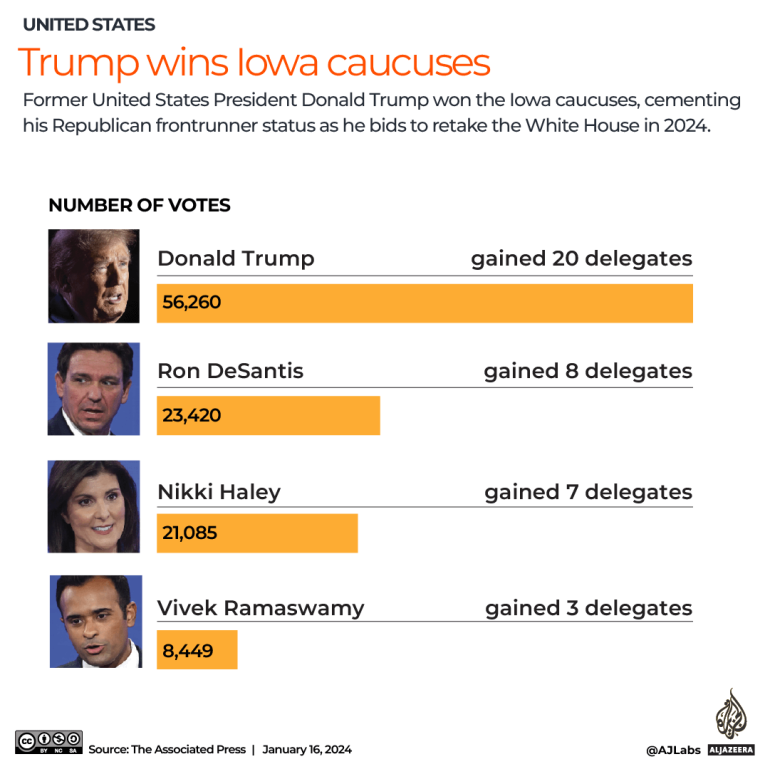EXPLAINER
Trump scores decisive victory in the first major caucus of the US presidential race as he cements his frontrunner status.
The race for the 2024 US presidential elections has kicked off with Monday’s Republican caucus in Iowa.
Former US President Donald Trump decisively won the caucus ballots and will now head to next week’s New Hampshire primary with a commanding lead over his rivals. Trump also secured an endorsement from opponent Vivek Ramaswamy, who dropped his bid following a disappointing loss.
Primaries and caucuses are ways Republicans and Democrats choose their presidential candidate. The majority of US states hold primaries while some traditional Republican states such as Iowa hold caucuses to elect delegates. Delegates elected at primaries and caucuses vote in the respective party conventions to nominate the party candidate. The Republican National Convention will be held in July.
Here’s what you need to know about the results and highlights.
Results
Trump cemented his status as a frontrunner of the Republican Party with 51 percent of votes. Trump likely received strong support from key voting blocs in the caucus – White evangelicals and very conservative voters.
Trump’s margin was the largest ever in an Iowa caucus, surpassing the previous record of 12.8 percentage points for Bob Dole in 1988.
His win comes despite mounting legal challenges on charges such as conspiracy to overturn the 2020 US election.
Trump garnered at least 20 of 40 delegates, while his nearest challenger Florida Governor Ron DeSantis took eight followed by Nikki Haley at seven, according to provisional tallies.
DeSantis received more than 21 percent of the votes, while Haley finished closely behind him with about 21 percent of votes. Ramaswamy got only approximately 8 percent of votes and gained three delegates.

Ramaswamy suspends presidential bid
Following his underwhelming finish, the entrepreneur announced that he was ending his presidential campaign.
He endorsed his rival, Trump, who he had previously called the “best president of the 21st century”.
Ramaswamy, who is a political outsider, modelled his campaign similar to Trump’s with headline-grabbing statements, unorthodox policy proposals and admonishment of his opponents.
“I’m more similar to Trump in 2015 than Trump today is to Trump in 2015,” Ramaswamy said in an interview with British podcast host Russell Brand, in August 2023.
Weather
This year’s Iowa caucus is said to have been the coldest on record amid low temperatures and winter storms.
The temperature in Des Moines was as low as -22 degrees Celsius (-7.6 degrees Fahrenheit) on Monday night, well below the 2004 Iowa caucus when it dipped to almost -9C (16F).
The caucus itself requires lengthy participation as voters had to first gather at assigned precincts at 7pm local time, and then proceeded to debate candidate options.
Turnout
The bitter cold during the Iowa caucus may have hurt participation levels as it witnessed the lowest voter turnout in more than a decade.
Edison Research estimated a turnout at 115,000 on Monday night – down from 186,657 in 2016. This was also lower than the 121,503 who showed up in 2012, and 119,207 voters in 2008.
What’s next?
The next GOP presidential primary is being held in New Hampshire on January 23.
The state will choose 22 delegates to represent it at the Republican convention.









